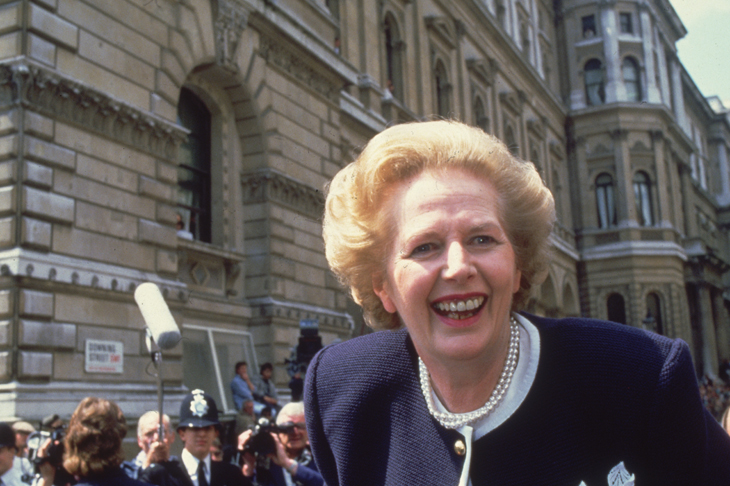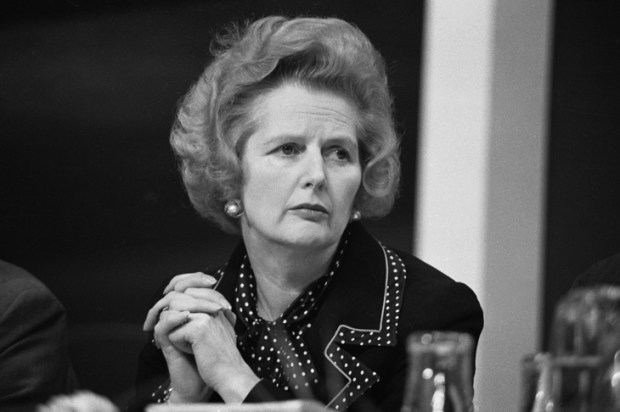I had certainly not intended to upset Margaret Thatcher when I joined the Times in 1987 but when we met she definitely took the contrary view. ‘So, you’re the young Australian whose causing me all this trouble,’ she pronounced, a dangerously large handbag hanging from her arm, when we were introduced as she arrived at a rather crowded reception at Australia House in November, 1987.
‘You really must talk to Lord Cockfield,’ she commanded. ‘He shall be in London tomorrow. My office will contact you.’ Deferentially, I mentioned that in fact I had already talked to Lord Cockfield, then vice-president of the Commission of European Communities in Brussels earlier in the week, without mentioning the long afternoon spent interrogating Euro MPs (including the son of a former British Governor-General of Australia and a von Bismarck) whilst drinking large snifters of Euro-brandy with a group of aged representatives of Europe.
The ‘trouble’ for which PM Thatcher held me personally responsible stemmed from a lengthy series on Britain and the EU looking forward to effects on the UK of the implementation of the Maastricht Treaty which was to be signed in February, 1992. Even before there was an organisation from which to ‘Brexit’, the Times team had identified the key problems that the EU would present post-1992. I had been seconded to the Times from the Australian, arriving days before the Great Storm, and was fortuitously teamed with a wonderful veteran, Jack Crossley, who was providentially a trusted friend of the aggressive editor Charlie Wilson. My role at the newspaper, still in the throes of the Wapping upheaval, wasn’t precisely spelled out. It was a sink-or-swim, see-what-you-can-make-of-it and management-will-see-what-it-makes-of-you kind of arrangement.
As a former New York-based correspondent and Deputy to the Editor-in-Chief of the Australian, seeking stories was instinctive and each morning Jack and I would walk into the news conference with folders of ideas culled from our hours of early morning reading of the regional, national and international press.
It was an eclectic gathering, but I always waited wondrously to watch as Peter Utley fumbled a cigarette from a pack (often passed to him by one of the covey of handsome young women who attended him) then struck a match, feeling for the flame with his stained fingertips as he lifted it to find the tip before his sightless eyes. Leon Pilpel, the letters editor, gave a deadpan rundown of the topics covered in the correspondence to be published and Philip Howard provided a witty and incisive summary of cultural topics. But mainly I listened as the news editors pitched their stories, the Hungerford shooting, the gist of the letters, and then the finale as the leader writers took over with their thoughts. I hadn’t given much thought to the EU but then it seemed no-one else had either, so I did some light scratching. What I learned in a brief time was that Britain was going to give away her sovereignty to Brussels-based bureaucrats and almost thoughtlessly.
It was easy to pull together some fairly basic examples and present them first to Crossley and then to Wilson; the extent of surrender to Brussels was not really understood and this is what the series, presented by a team of terrific correspondents, demonstrated.
Even Mrs Thatcher had not grasped the degree to which eurocrats were going to dictate policy to Westminster. I believe that it was only after that series that Mrs Thatcher started raising the questions which should have been debated long before the UK moved to join Europe.
Almost a year later, in August, 1988, during a tour of Asia, she said the single market was a ‘welcome development’ but ‘you must still have barriers and boundaries to stop crime and illegal immigration’. She attacked elements of the plan not based on free trade. In Bruges in September, 1988, she said: ‘Of course we must make it easier for goods to pass through frontiers. Of course we must make it easier for our people to travel throughout the Community. But it is a matter of plain common sense that we cannot abolish border controls if we are also to protect our citizens and stop the movement of drugs, of terrorists, of illegal immigrants.’ She echoed the concerns raised by the Times and attacked the centralisation of power in Brussels and the folly of trying to create ‘an identikit European personality’.
It was of course too late to change the trajectory launched with the Treaty of Rome in 1957, but to my antipodean eye it was clear that those in Brussels responsible for the wine lake (which I did my best to try to drain) and the butter mountain (which I left to others to scale) were set to remodel Europe into a new world order with bureaucrats in control.
Jacques Delors, a former French finance minister who went on to serve several terms as president of the European Commission, boasted in 1988 that monetary union was just the beginning and that ‘there would have to be the embryo of a European government in one form or another’ by the mid-1990s. Germany’s Chancellor Helmut Kohl took the view that the European parliament would, sooner or later, exercise powers ‘not far below those enjoyed at present by national parliaments’.
Article 8A of the Single European Act defines the internal market specifically as an ‘area without internal frontiers’, Europe sans frontiers, and this is what they got. The mess that millennials and supporters of the Remain campaign loved most, as do criminals and terrorists, and illegal immigrants.
I returned to Australia in late 1988 to take up the editorship of the Adelaide Advertiser, a newspaper Rupert Murdoch had ached to own since he was a brash young publisher. It was whilst there the following year that I received a small package in the inter-office mailbag containing a pocket-sized edition of a grey-covered book, The Times Guide to 1992.
The authors, Richard Owen and Michael Dynes, wrote most generously in the preface their thanks to Piers Akerman, ‘who was responsible for the Times’ series on 1992 and provided the idea for this book. As an Australian, and thus an ‘outsider’, he perceived perhaps better than many Europeans the significance of the process taking shape.’
Probably the greatest praise I would ever receive professionally though I was humbly surprised when literary editor Howard nudged my surname into the Times’ crossword, the clue being ‘Dickensian gaoler or jovial Australian journalist’. The guide to 1992 went through a number of printings but had there been greater debate then there may not have been a need for Brexit now.
Got something to add? Join the discussion and comment below.
Get 10 issues for just $10
Subscribe to The Spectator Australia today for the next 10 magazine issues, plus full online access, for just $10.
You might disagree with half of it, but you’ll enjoy reading all of it. Try your first month for free, then just $2 a week for the remainder of your first year.














Comments
Don't miss out
Join the conversation with other Spectator Australia readers. Subscribe to leave a comment.
SUBSCRIBEAlready a subscriber? Log in